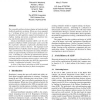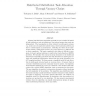1122 search results - page 197 / 225 » Modelling Cooperative Multi-agent Systems |
145
click to vote
ATAL
1997
Springer
15 years 4 months ago
1997
Springer
Abstract. Just as cooperation in multi-agent systems is a central issue for solving complex tasks, so too is the ability for an intelligent agent to reason about combined knowledge...
141
click to vote
HICSS
1996
IEEE
15 years 4 months ago
1996
IEEE
The venerable problem solving technique of simulation finds itself inthe midstof a revolution. Where once it was regarded as a "technique of last resort" for systems ana...
121
click to vote
RML
2002
15 years 4 days ago
2002
The trend towards highly specialized solution providers cooperatively offering configurable products and services to their customers requires the extension of current (standalone)...
148
Voted
KDD
2012
ACM
13 years 2 months ago
2012
ACM
Real-world, multiple-typed objects are often interconnected, forming heterogeneous information networks. A major challenge for link-based clustering in such networks is its potent...
94
Voted
ICRA
2003
IEEE
15 years 5 months ago
2003
IEEE
Existing task allocation algorithms generally do not consider the effects of task interaction, such as interference, but instead assume that tasks are independent. That assumptio...


